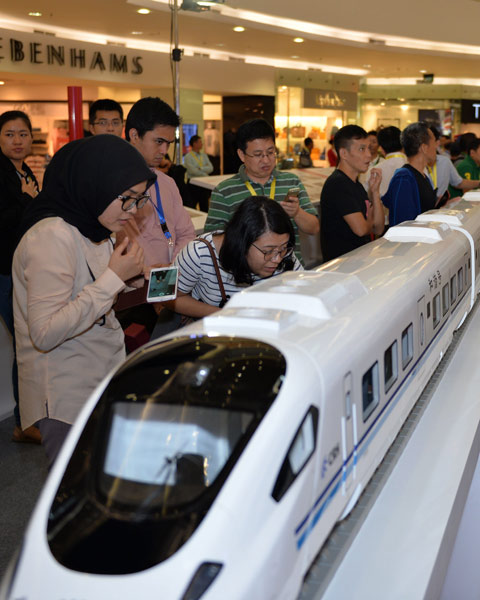Rail an 'ideal field' overseas
 0 Comment(s)
0 Comment(s) Print
Print E-mail China Daily, March 16, 2016
E-mail China Daily, March 16, 2016
|
|
|
Visitors look at a high-speed train model during an exhibition in Jakarta. [Photo/Xinhua] |
China should speed up the standardization of its high-speed railway technologies and take the lead in setting international standards, an industry insider suggested.
Xu Baocheng, an executive of China Tiesiju Civil Engineering Group in Anhui province and a deputy to the 12th National People's Congress, said standards are crucial to facilitating Chinese railway enterprises' overseas expansion.
"Seizing the international railway market is of strategic and economic importance to China. It will help resolve the overcapacity in industrial manufacturing, engineering and construction industries," he said on the sidelines of the top legislature's ongoing annual session in Beijing.
"In addition, the overseas railway market is an ideal field for us to invest in and thus to increase our foreign exchange reserves."
The government will strive to have the international railway community recognize and accept Chinese high-speed railway standards and take the lead in setting universal standards, according to the senior engineer.
"Currently, technological standards are dominated by several industry giants from Western nations, while our country has yet to even make an English-language version of high-speed railway standards," Xu explained.
China released its first standards for high-speed railways in December 2014, governing nearly 20 aspects of design and construction of high-speed lines operating at speeds from 250 km/h to 350 km/h.
Xu also urged authorities and enterprises to launch a massive publicity campaign in nations covered by the Belt and Road Initiative and other countries aspiring to high-speed rail lines. Such a campaign can focus on the huge benefits that high-speed railways have brought to China and the advantages of Chinese rail technologies and experience, he added.
The Belt and Road Initiative, a development strategy proposed by the Chinese government in 2013, refers to the Silk Road Economic Belt, which will link China with Europe through Central and western Asia, and the 21st Century Maritime Silk Road, which stretches from southern China to Southeast Asia, and even to Africa.
The ambitious plan aims to benefit about 4.4 billion people in 65 nations, the government said.
"We can hold a large-scale exhibition, like the aviation and space industries' Zhuhai air show, to display new designs, engineering techniques, advanced equipment and the management expertise of our railway industry," Xu suggested.
By the end of 2015, China had built a high-speed rail network of more than 19,000 km, accounting for more than 60 percent of the world's entire high-speed lines.






